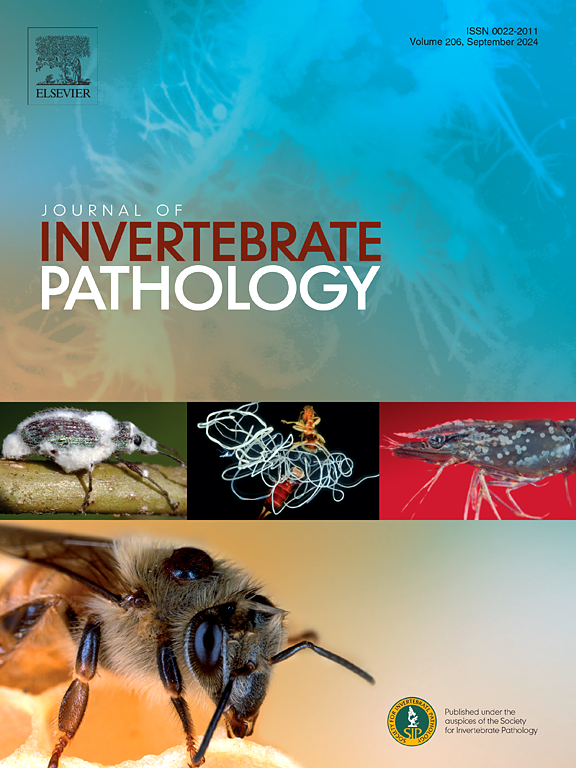Diet-induced mechanical stress promotes immune and metabolic alterations in the Drosophila melanogaster digestive tract
IF 2.4
3区 生物学
Q1 ZOOLOGY
引用次数: 0
Abstract
A fundamental query in immunology is how cells recognize danger in the tissue milieu. For many years, standpoints were mainly centered around damaged cells or structures of invading pathogens, like lipopolysaccharide, being the initiators of danger signals to activate immunity. Today, rising evidence presents “biophysical signals” as potential regulators of immune cell functions too. This emerging notion of the ability of tissue mechanotransduction to tune the immunological system appears to likewise exist in other body system, among which is the metabolic system, where startling connection between mechanotransduction and enzymes known to regulate metabolism have been also reported. Being continuously subjected to mechanical forces, and owing to its multifaceted role in not only absorbing and digesting nutrients, but also in supporting important immunological defense strategies as well as metabolic responses, attention has been lately given to organs making up the gastrointestinal (GI) tract, predominantly the intestine, with growing interest in unravelling the impact of mechanotransduction on the intestinal environment is on the rise. As such, we investigated in this study the impact of mechanical stress introduced by ingesting diet containing the indigestible fiber methylcellulose (MC) on gut immune and metabolic activities using the Drosophila melanogaster model organism. Our findings reveal that feeding on MC-containing diet causes consequential alterations in the fly gut environment manifested by enlargement of the midgut diameter, remodeling of the microbiota community, activation of immune responses, differential regulation of the tachykinin (Tk) peptide hormone expression and modulation of lipometabolism. Particularly, we show that feeding on MC-containing diet promotes a marked increase in the relative abundance of Leuconostocaceae/Leuconostoc, microbiota-dependent Reactive Oxygen Species (ROS) production, IMD pathway activation, and IMD-dependent elevation in Tk expression. We also demonstrate that maintaining flies on MC-containing diet for several days leads to a reduction in body weight and in systemic glucose and triacylglycerol levels and modulates lipid droplets accumulation and storage in the gut and fat body. Taken together, these findings provide novel insight into the effect of diet induced-mechanical forces on the intestinal physiology and pathology.

饮食诱导的机械应激促进黑腹果蝇消化道的免疫和代谢改变。
免疫学的一个基本问题是细胞如何识别组织环境中的危险。多年来,观点主要集中在入侵病原体的受损细胞或结构,如脂多糖,是激活免疫的危险信号的发起者。今天,越来越多的证据表明,“生物物理信号”也是免疫细胞功能的潜在调节因子。组织机械转导调节免疫系统的能力这一新兴概念似乎同样存在于其他身体系统中,其中代谢系统,机械转导与已知调节代谢的酶之间的惊人联系也已被报道。由于不断受到机械力的影响,并且由于其在吸收和消化营养物质方面的多方面作用,而且还支持重要的免疫防御策略以及代谢反应,最近人们对胃肠道(GI)的器官(主要是肠道)的关注越来越多,对揭示机械转导对肠道环境的影响的兴趣正在上升。因此,我们在本研究中利用黑腹果蝇模型生物研究了摄入含有不可消化纤维甲基纤维素(MC)的饮食所引入的机械应力对肠道免疫和代谢活动的影响。我们的研究结果表明,食用含有mc的食物会导致果蝇肠道环境的相应改变,表现为中肠直径增大,微生物群落重塑,免疫反应激活,速激肽(Tk)肽激素表达的差异调节和脂肪代谢的调节。特别是,我们发现,食用含mc的日粮可显著增加Leuconostocaceae/Leuconostoc的相对丰度、微生物依赖的活性氧(ROS)产生、IMD通路激活以及IMD依赖的Tk表达升高。我们还证明,在含有mc的饮食中维持果蝇数天,可以减少体重,降低全身葡萄糖和甘油三酯水平,并调节脂肪滴在肠道和脂肪体中的积累和储存。综上所述,这些发现为饮食诱导的机械力对肠道生理和病理的影响提供了新的见解。
本文章由计算机程序翻译,如有差异,请以英文原文为准。
求助全文
约1分钟内获得全文
求助全文
来源期刊
CiteScore
6.10
自引率
5.90%
发文量
94
审稿时长
1 months
期刊介绍:
The Journal of Invertebrate Pathology presents original research articles and notes on the induction and pathogenesis of diseases of invertebrates, including the suppression of diseases in beneficial species, and the use of diseases in controlling undesirable species. In addition, the journal publishes the results of physiological, morphological, genetic, immunological and ecological studies as related to the etiologic agents of diseases of invertebrates.
The Journal of Invertebrate Pathology is the adopted journal of the Society for Invertebrate Pathology, and is available to SIP members at a special reduced price.

 求助内容:
求助内容: 应助结果提醒方式:
应助结果提醒方式:


